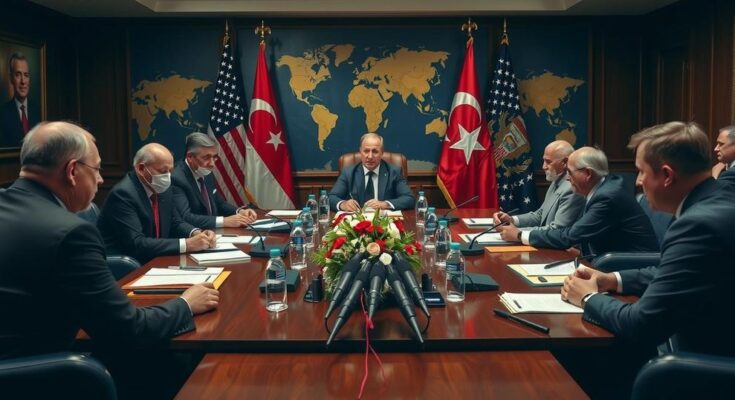G20 leaders convened in Rio to advocate for ceasefires in Gaza and Lebanon, address climate change, and tackle poverty. The summit emphasized the political origins of hunger, introduced initiatives for poverty reduction, and highlighted challenges in global climate finance. Leaders condemned aggression without specifically naming Russia but supported peace efforts regarding Ukraine.
In a recent summit held in Rio de Janeiro, G20 leaders issued a call for comprehensive ceasefires in both Gaza and Lebanon. The meeting centered on pressing global issues, including climate change, poverty alleviation, and equitable taxation of the wealthy. Brazilian President Luiz Inacio Lula da Silva emphasized the political nature of poverty and hunger, while the gathering underscored the importance of collaborative efforts to address these challenges. Leaders expressed grave concern over the humanitarian crises in these regions, aiming for a cohesive approach to fostering peace and stability. While the situation in Ukraine dominated discussions, with leaders reaffirming a commitment to support initiatives that advocate for peace, the G20 declaration notably refrained from denouncing Russian aggression explicitly. Russian Foreign Minister Sergey Lavrov represented Moscow at the summit in the absence of President Vladimir Putin, who is subject to an arrest warrant from the International Criminal Court. The declaration mentioned Ukraine and condemned territorial aggression without specifically calling out Russia. The call for a ceasefire in Gaza aligns with a US-backed proposal for a United Nations resolution that seeks a permanent cessation of hostilities alongside the release of all hostages by Hamas. Similarly, leaders highlighted the escalating conflict in Lebanon, advocating for conditions that ensure the safe return of citizens to their homes across the Blue Line, which separates Lebanon from Israel. President Lula introduced a global initiative aimed at combating hunger and poverty, contextualizing these issues as consequences of political choices rather than lack of resources. This initiative witnessed support from 81 countries and endorsements from various philanthropic organizations, emphasizing a united front against these pervasive issues. Despite this, Argentina’s right-wing administration, led by President Javier Milei, expressed dissent on several fronts, reflecting the complexities of international cooperation. The dialogue also touched on climate change, although no substantial breakthroughs were achieved regarding funding mechanisms. Leaders acknowledged the necessity of increasing climate financing significantly but fell short of defining specific contributions from wealthier nations to assist poorer countries in these efforts. They agreed on the importance of setting forth clear financial commitments by the conclusion of the upcoming COP29 climate summit, aiming to create actionable strategies for managing climate-related challenges globally.
The G20 summit brought together leaders from the world’s largest economies to discuss impactful global issues. With heightened geopolitical tensions, a primary focus was the crises in Gaza and Lebanon alongside pressing matters such as climate change and socio-economic inequalities. The summit was significant not only for its discussions on conflict resolution but also for its emphasis on the intersection of poverty alleviation, global cooperation, and environmental responsibilities. This context underlines the importance of addressing humanitarian concerns and sustaining economic growth while seeking multifaceted solutions.
The G20 leaders’ summit in Rio de Janeiro underscored the urgency of fostering peace through comprehensive ceasefires in Gaza and Lebanon, while addressing critical global issues such as poverty and climate change. Brazilian President Lula’s initiatives aimed at tackling hunger, coupled with advocacy for fair taxation, represent a commitment to humanitarian efforts and inclusive economic policies. Despite challenges such as dissent from certain member states and the nuances surrounding geopolitical disputes, the call for unity in addressing these complex problems remains paramount as the global community navigates these pressing challenges.
Original Source: www.aljazeera.com




